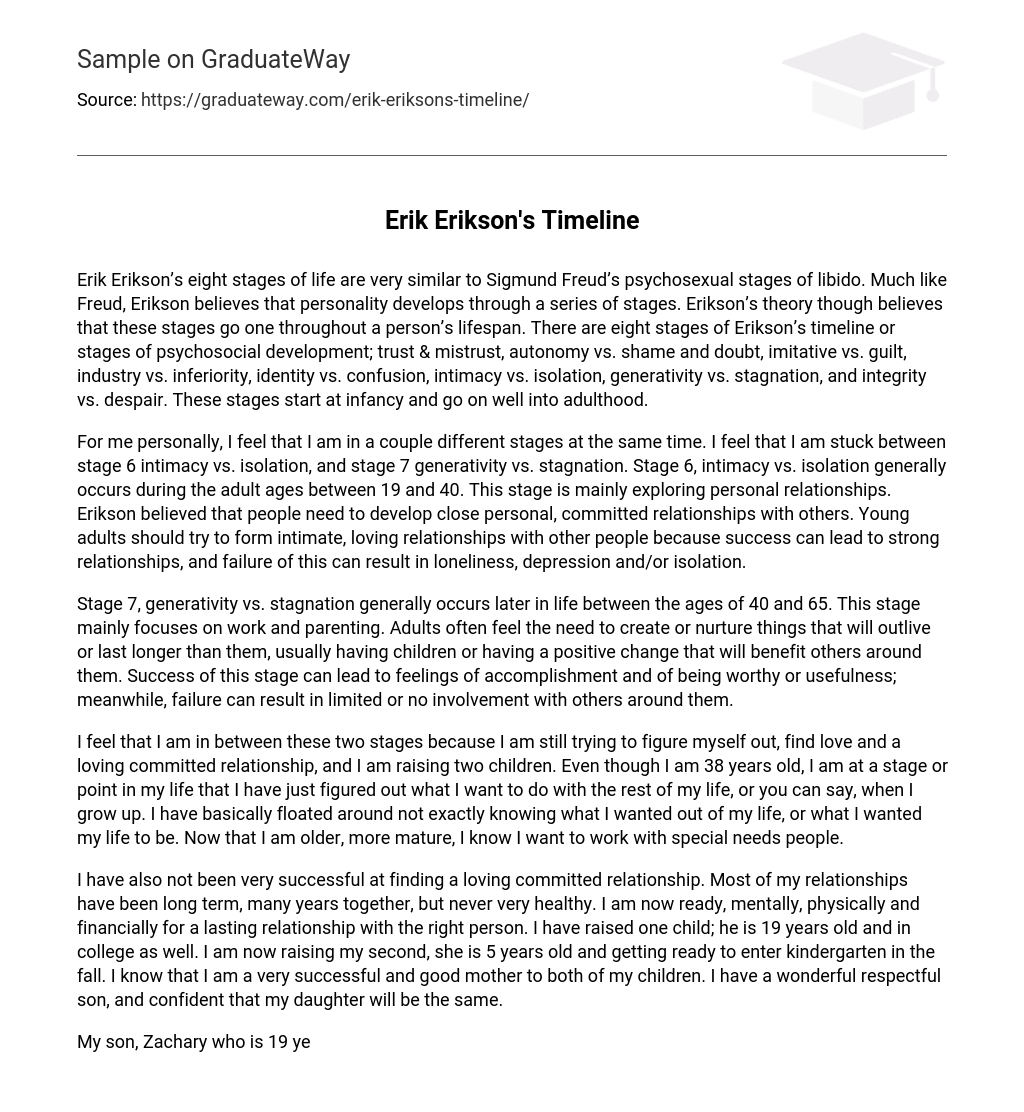Erik Erikson’s theory of development is similar to Sigmund Freud’s psychosexual stages. Both theorists propose that personality evolves through a series of stages. However, Erikson emphasizes that these stages continue throughout an individual’s entire life span. The eight stages of Erikson’s psychosocial development are: trust & mistrust, autonomy vs. shame and doubt, initiative vs. guilt, industry vs. inferiority, identity vs. confusion, intimacy vs. isolation, generativity vs. stagnation, and integrity vs. despair. These stages start in infancy and extend into adulthood.
Personally, I feel that I am simultaneously progressing through two stages. I find myself in a phase where I am navigating between stage 6, which focuses on intimacy versus isolation, and stage 7, which is about generativity versus stagnation. The intimacy versus isolation stage typically occurs during adulthood, specifically between the ages of 19 and 40. It revolves around exploring personal relationships and developing close, committed bonds with others. Erikson’s theory suggests that young adults should strive to establish intimate and loving connections with others. Achieving success in forming these relationships can contribute to the development of strong bonds, while failure in doing so may result in feelings of loneliness, depression, or isolation.
Stage 7, also referred to as generativity vs. stagnation, is typically experienced in later life, generally between the ages of 40 and 65. In this stage, individuals mainly concentrate on their work and parenthood, with a strong desire to create or nurture things that will leave a lasting impact beyond their own lifespan. This often entails having children or making a positive contribution that benefits others. Effectively traversing this stage can lead to feelings of satisfaction and worth, while lack of success may result in limited or no engagement with those in their vicinity.
Approaching the age of 38, I am currently in a transitional phase where I am still discovering my true identity and searching for both love and a committed relationship while also raising two children. This stage of life has brought clarity to my future goals – specifically, what I want to achieve or who I aspire to be. In the past, I wandered aimlessly without direction or understanding of my purpose. However, now that I am older and wiser, it is clear to me that my focus should be on working with individuals who have special needs.
Despite my previous long-term relationships, I have been unable to find a loving committed partnership. Although these relationships lasted for an extended period of time, they lacked in terms of being healthy. At this moment, I am mentally, physically, and financially prepared to engage in a lasting relationship with the right individual.
As a mother who has already raised one child who is now 19 and attending college, I am currently raising my second child – a five-year-old girl who will be starting kindergarten in the upcoming fall. Being able to successfully and nurturingly care for both of my children brings me great pride. My son is exceptional and respectful, which gives me confidence that my daughter will also exhibit similar qualities.
My 19-year-old son, Zachary, who is currently in his first year of college, is going through stage 5 – identity vs. confusion. In this stage, teenagers often feel the need to establish their own sense of self and navigate their personal identity. The outcome can result in staying true to oneself and fulfilling personal desires and needs. However, failing during this stage may lead to feeling confused about one’s identity and a weakened self-esteem. Currently, Zachary is facing challenges in determining his future path, selecting a college major, and finding where he fits among his current group of friends.
Irrespective of the individual’s current stage, the process of self-discovery and establishing a sense of identity, desires, and belonging can be challenging. Familiarizing oneself with these eight developmental stages can assist in comprehending the reasons behind personal obstacles and aid in identifying desired objectives.
References
These are the sources and links included in the text:
- “McAdams, D. P.” – author of “The person: A new introduction to personality psychology” (4th ed.) published by Wiley in 2006.
- The New York Times – published an article in 2011 on About.com with the link http://psychology.about.com/library/bl_psychosocial_summary.
- Cherry, K. – contributed a source from About.com and the New York Times available at http://psychology.about.com/od/psychosocialtheories/a/psychosocial.





